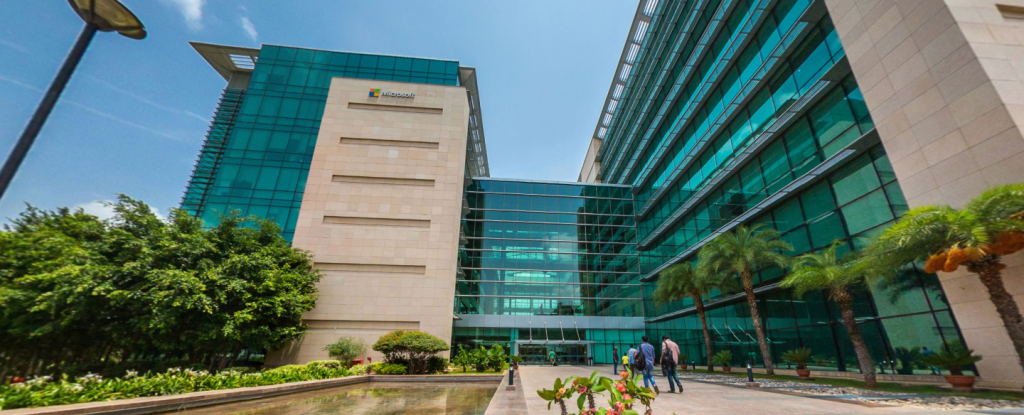
Asia Innovation Tour 2017 – driving innovation for emerging markets
Located in the bustling technology suburb of Hyderabad, the sprawling 54-acre Microsoft India campus is in many ways a manifestation of the company’s aspiration to empower individuals, organizations and communities with technology.
The campus consists of three state-of-the-art buildings surrounded by a garden of greenery, complete with its own nature park and a 30-million-liter reservoir. The intersection of these buildings with nature is reflective of Microsoft’s philosophy where the understanding of how the natural world works, goes hand-in-hand with technological advances and innovations.
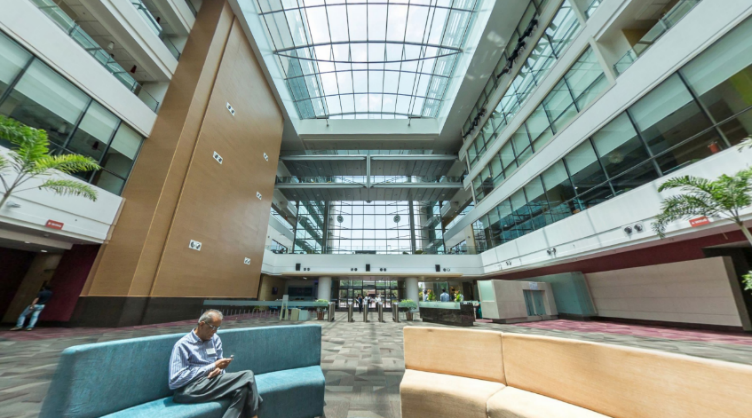
The buildings’ interiors sport the hallmarks of a futuristic technology company. There are plenty of vibrant, open work spaces, facilities equipped with the latest digital tools and spacious common areas, all designed to offer employees a wide range of ways to interact, collaborate and get things done. After all, Microsoft’s mission is to empower everyone to achieve more and there is no better place to start than with our own employees.
Realizing this mission will depend significantly on research and engineering. The campus houses one of Microsoft’s largest research and development (R&D) centers outside Microsoft’s Redmond headquarters in the United States. The center represents our strategy of globally shared development to engineer and build products and services. The research and engineering teams are not only focused on fulfilling the company’s three big ambitions – building the intelligent cloud, reinventing productivity and business processes, and creating more personal computing – they are also aiming to democratize Artificial Intelligence (AI) for all.
Introducing Innovation from Asia
To raise awareness about the technology solutions and the benefits that Microsoft India is driving, we organized the Asia Innovation Tour 2017 hosting journalists from prominent media outlets across the region. This two-day session provided the attendees with an in-depth look at our research and engineering work. It also gave them a chance to learn more about the innovations that are coming out of Asia.
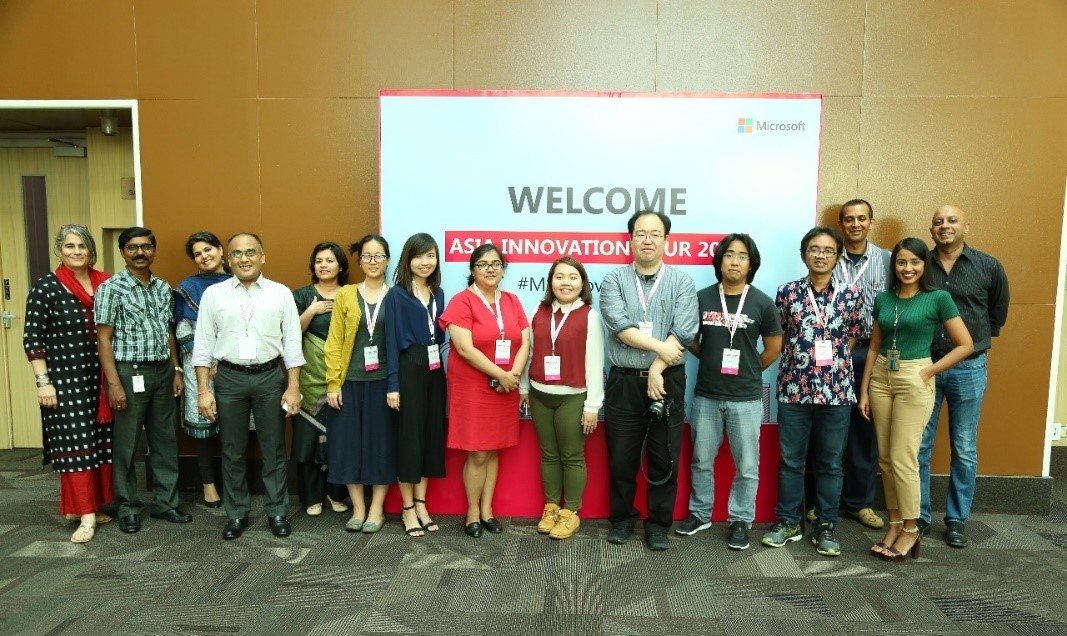
In recent years, with economic growth fueling Asian markets, many countries in the region are experiencing an upswing in opportunities. We believe that innovation will play a critical role in enabling them to fully capitalize on these opportunities. This will allow these markets to dramatically improve their economies and their quality of life. Addressing the needs and aspirations of people in developing communities was a recurring theme of the tour.
Driving Innovations for Emerging Markets
What really set this year’s tour apart was the strong emphasis on innovations for emerging markets. Many of Asia’s developing countries have a large capacity for new technologies. This is no surprise as Asia is home to 1.8 billion or 50% of the world’s Internet users[1], which far exceeds the combined Internet population of America and Europe. In the same vein, there are 2.5 billion mobile service users in Asia Pacific and an additional 600 million subscribers will join their ranks by 2020. India alone will contribute 250 million new users[2].
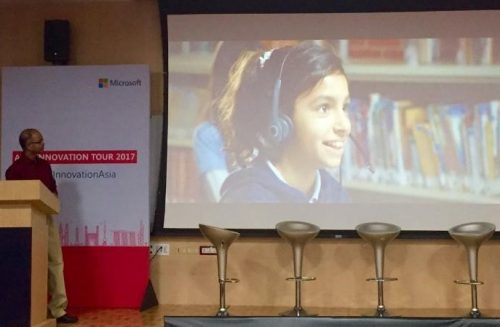
However, emerging markets still face several key challenges, including underdeveloped infrastructure, limited Internet bandwidth and mobile data constraints. India also provides optimal conditions – including a mobile-first culture and a conducive business environment – for the engineering teams to pilot game-changing solutions for the region before offering the company opportunities to scale them globally.
During the Asia Innovation Tour, the journalists had the chance to see many of these initiatives in action. Although these projects address challenges across many sectors, including public services, education, agriculture and healthcare, their goals are the same – to improve lives in underserved rural and urban communities and to enable people and organizations to reach greater heights.
Here are the snapshots of some of the initiatives that were highlighted during the event:
Combatting Tuberculosis (TB) with low-cost monitoring
99DOTS is a project which uses mobile phones to help fight TB. This infectious disease is completely curable yet over 1 million people die from TB every year. One of the major challenges that healthcare providers face is to ensure that patients complete a full six-month course of antibiotics. 99DOTS introduces a simple yet effective solution – custom envelopes which hide phone numbers behind the medication- that are designed to help patients to make a full recovery.
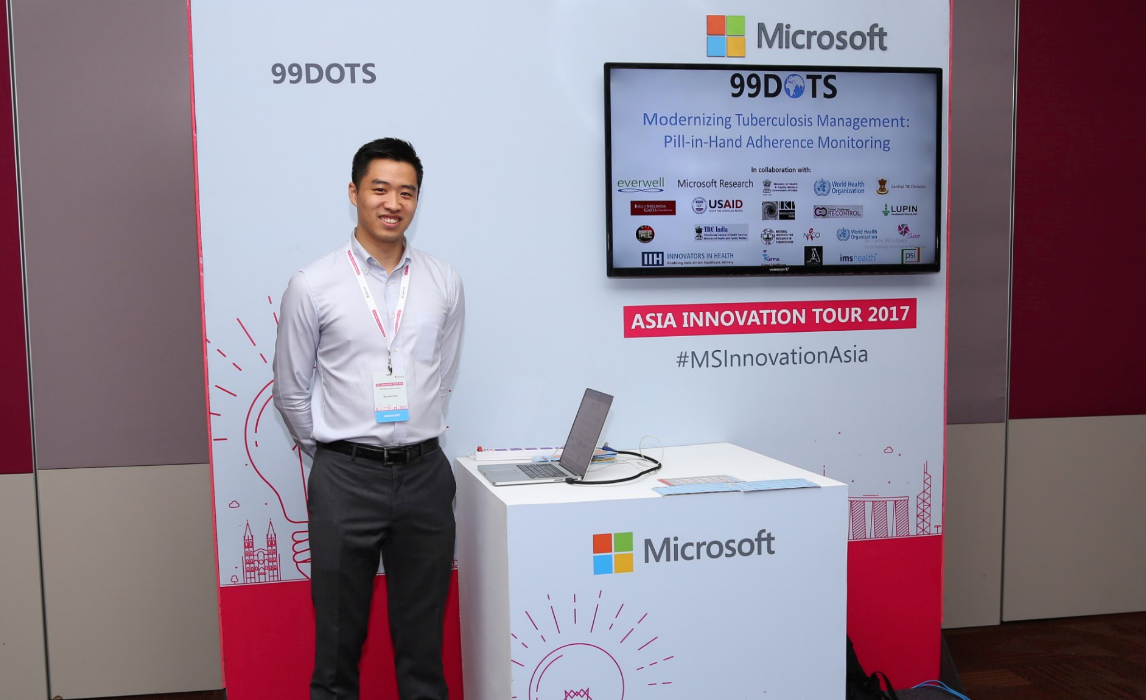
Healthcare professionals wrap each anti-TB blister pack in this special envelope and patients can only see the hidden numbers after dispensing their pills. After taking their daily medication, patients will need to call the hidden phone number. The combination of the call and the patient’s caller ID yields high confidence that the dose was “in-hand” and they took the dose. Over 90% of all doses were accurately reported using 99DOTS. To date, this project has enrolled over 25,000 patients in India and a smaller number of patients in Myanmar.
Helping Workers Upskill to Meet the Demands of Tomorrow
Project Sangam is a cloud-hosted platform that allows on-site and online learning by students and job seekers. This simple yet powerful solution is designed for the blue-collar medium to low-skilled workers in India. The initiative aims to bridge India’s skills gap and enable the country to take another step forward in its digital transformation journey.
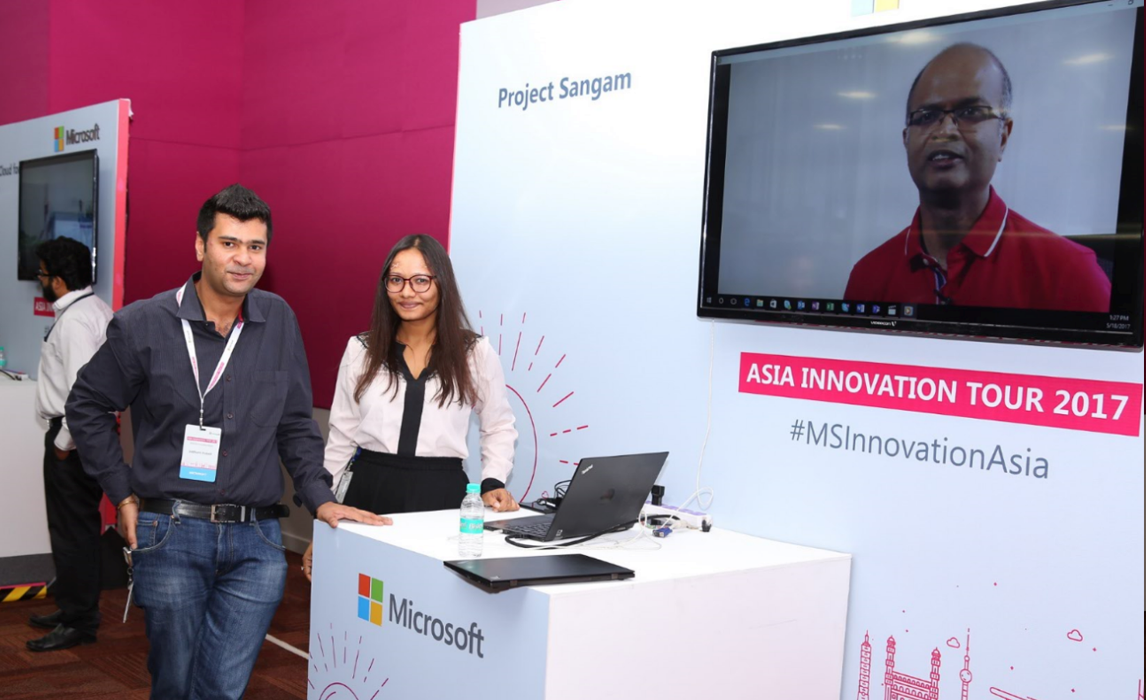
Project Sangam was one of the demos showcased at the tour and the attendees had the opportunity to learn how the initiative uses Massively Empowered Classroom framework, Microsoft’s Azure cloud platform and services and LinkedIn to support new entrants to the job market. It also has the capabilities to help training institutions and universities improve learning outcomes while enabling students and workers to equip themselves with future-relevant skills.
Improving Crop Yield with Intelligent Cloud
Microsoft, the International Crops Research Institute for the Semi-Arid Tropics (ICRISAT), and the Andhra Pradesh government formed a partnership to pilot a Sowing App for farmers. The app was developed to help farmers achieve optimal harvests by advising them on the best time to sow using data on weather conditions, soil and other indicators.
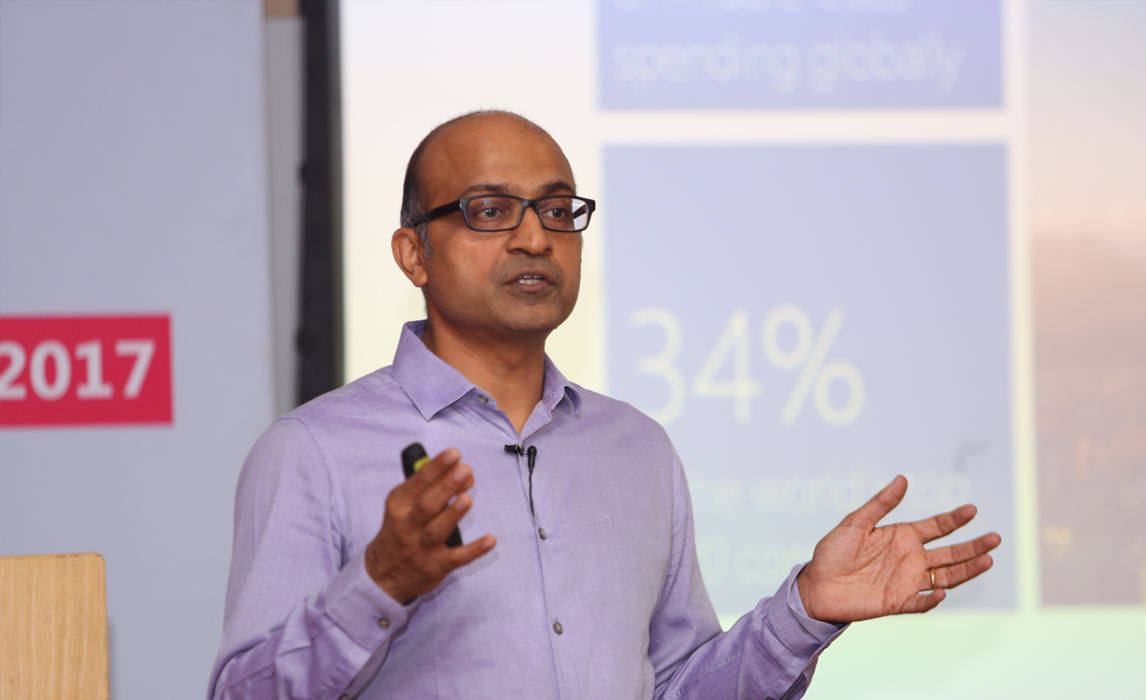
Anil Bhansali, Managing Director, Microsoft India (R&D) Private Limited and Corporate Vice President, Cloud & Enterprise, who heads up the Microsoft India Development Center, shared how ICRISAT adopted Microsoft’s Cortana Intelligence Suite, including Machine Learning and Power Business Intelligence (BI), to promote digital farming practices in the state. This solution provides important insights around soil health, fertilizer recommendations, and seven-day weather forecasts derived from the world’s best available weather observation systems and forecast models. The pilot garnered a 30% higher yield which clearly demonstrates the applicability and benefits that intelligent cloud can bring to digital agriculture. Anil also talked about the Microsoft Intelligent Network for Eyecare (MINE) – which is a global consortium of eminent eyecare organisations coming together to apply artificial intelligence to help eliminate avoidable blindness and scale delivery of eyecare services worldwide. The collective data and collaboration of MINE has immense potential in the field of public health.
Improving Business Productivity at your Fingertips
Kaizala is Microsoft’s productivity app for real-time coordination and it is designed specifically for a changing, mobile-first landscape. Built predominantly for enterprise use, this simple chat-based mobile app offers organizations a communication platform to facilitate easy delegation and monitoring of tasks to enhance productivity.
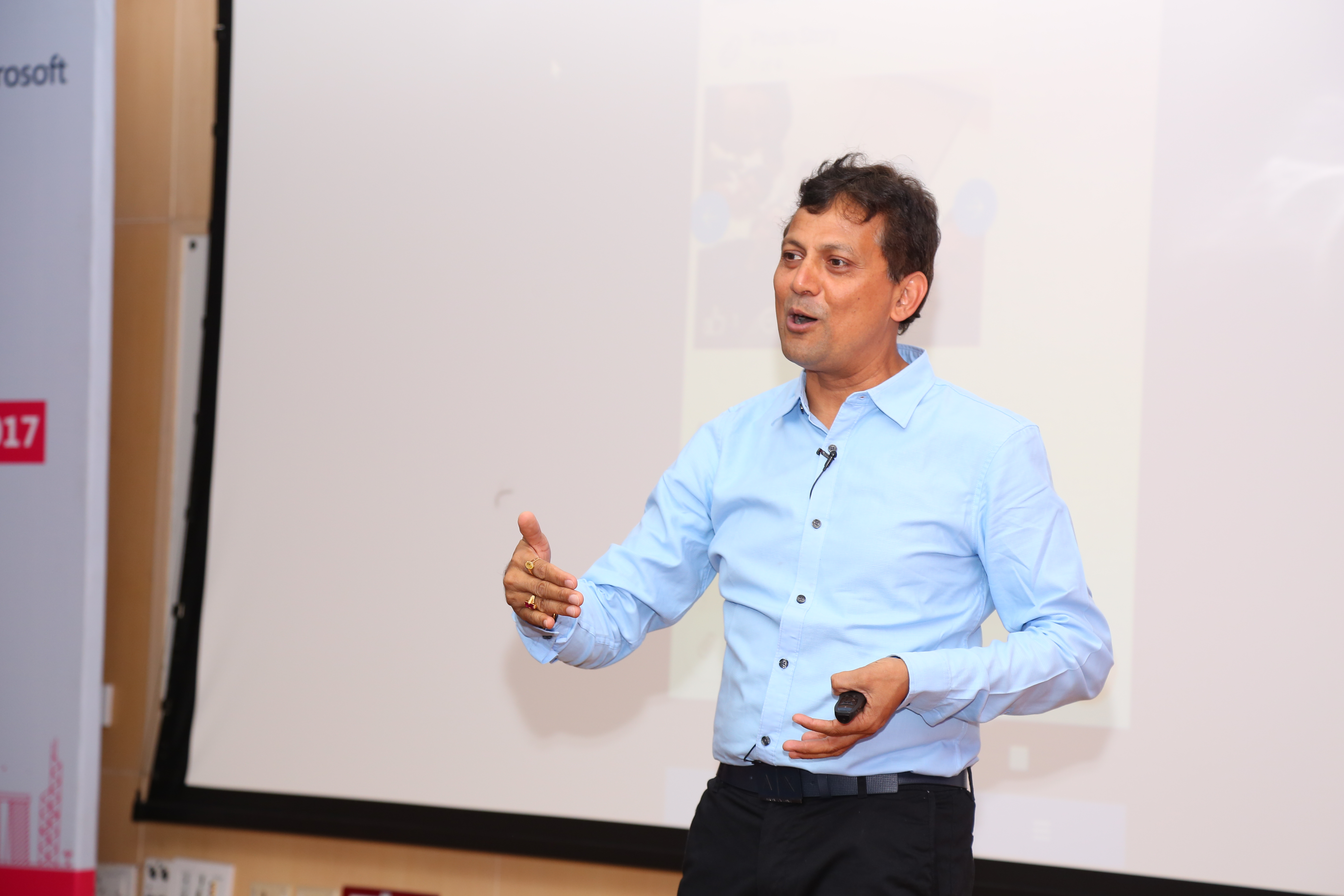
Rajiv Kumar, Corporate Vice President, Office Product Group, Microsoft, demonstrated how businesses can easily and swiftly set up groups that align with the organization structure and on-board partners and vendors to drive seamless collaboration on the go. The app’s organizational attributes minimize digital clutter and unnecessary messages. He also illustrated how the app can allow companies to track their resources and initiate tasks by simply activating the ‘action’ functions.
Facilitating Real-time Incident Management and Greater Collaboration Between Multi-Disciplinary Team
Kaizala is not only an excellent productivity solution for businesses but also a great tool to increase the efficiency, coordination and response time for public services. Rajiv shared that the app has been successfully tested by the government of Andhra Pradesh in India at Pushkaram, a 12-day event which involves more than 20 million pilgrims.
More than 20,000 government officials, event staff and volunteers collaborated on Kaizala around the clock. More than 1.6 million messages were generated throughout the event and 5,000 incidents, including food, sanitation, transport and security issues, were addressed in real-time. Impressed with its functionalities, the Chief Minister, Chandrababu Naidu of the government of Andhra Pradesh, is now using Kaizala for Citizen Connect, an initiative that enables citizens to directly reach out to the Chief Minister. This further supports the government in its mission to drive more transparency and citizen participation.
Innovating for a Better Tomorrow
Without a doubt, many of the innovations highlighted at the Asia Innovation Tour offer emerging markets a promising way to boost their productivity and prosperity without relying solely on demographic factors such as population growth or natural resources. More importantly, by leveraging technology to tackle some of the most complex and cumbersome issues around healthcare and education, we believe that we are not only improving the living standards for the people today but also laying the foundation for a brighter tomorrow for the next generation.
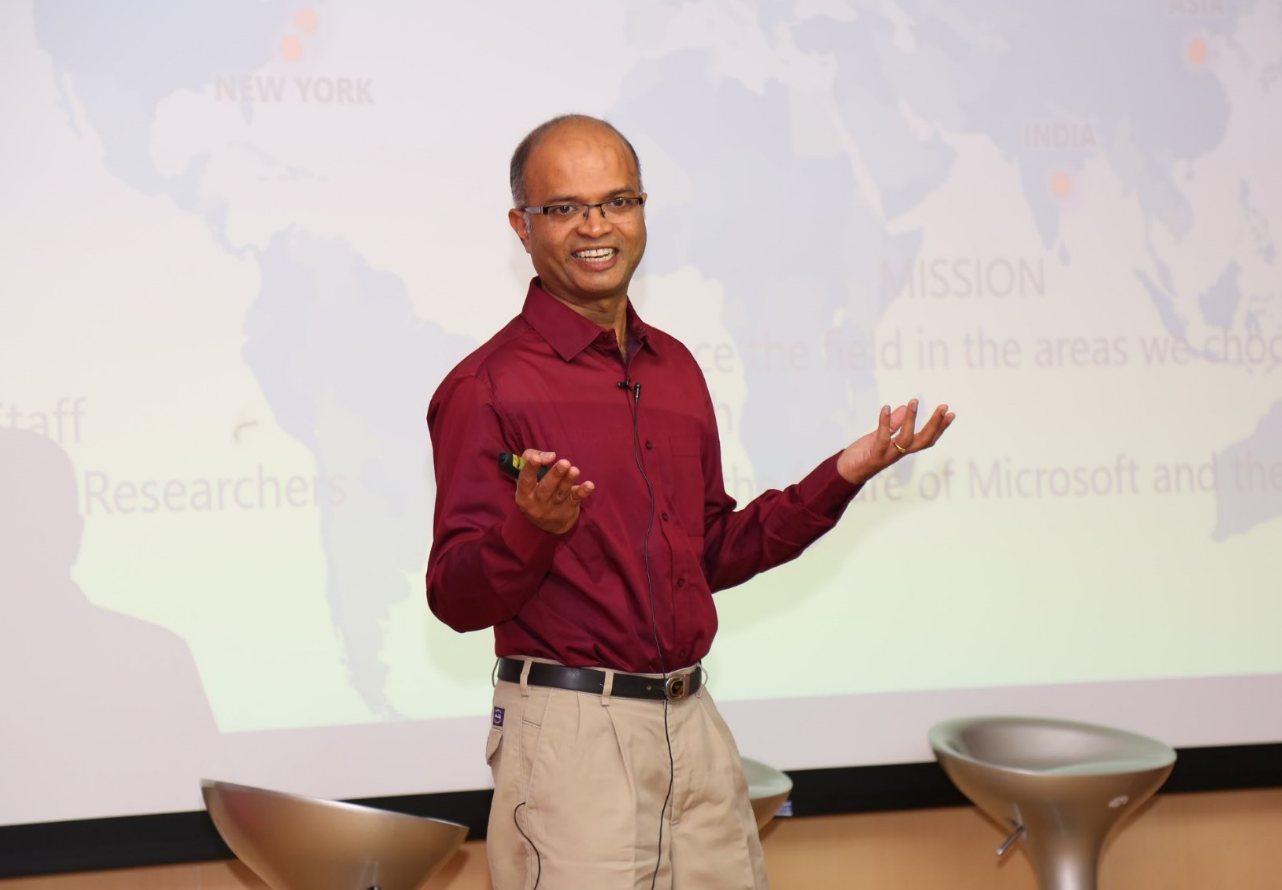
As Sriram Rajamani, Managing Director, Microsoft Research India, who leads the Microsoft India Research unit, eloquently puts it, “At Microsoft Research, our goal is to impact not only computer science and Microsoft as a company but also help solve some of our society’s most challenging problems.” This mission can be exemplified by many Microsoft initiatives, including Project Melange which aims to train language technologies and natural user interfaces to understand multiple languages in a single conversation. This project will allow digital personal assistants to hold more human-like dialogues while enabling millions of people in emerging markets to leverage language technologies to enter a world that is currently almost inaccessible to them.
Technology can be a powerful force for improving people’s lives and we are committed to making its benefits more accessible to everyone. Our goal is to inspire and enable people and organizations so that they can aspire and scale to new heights.















